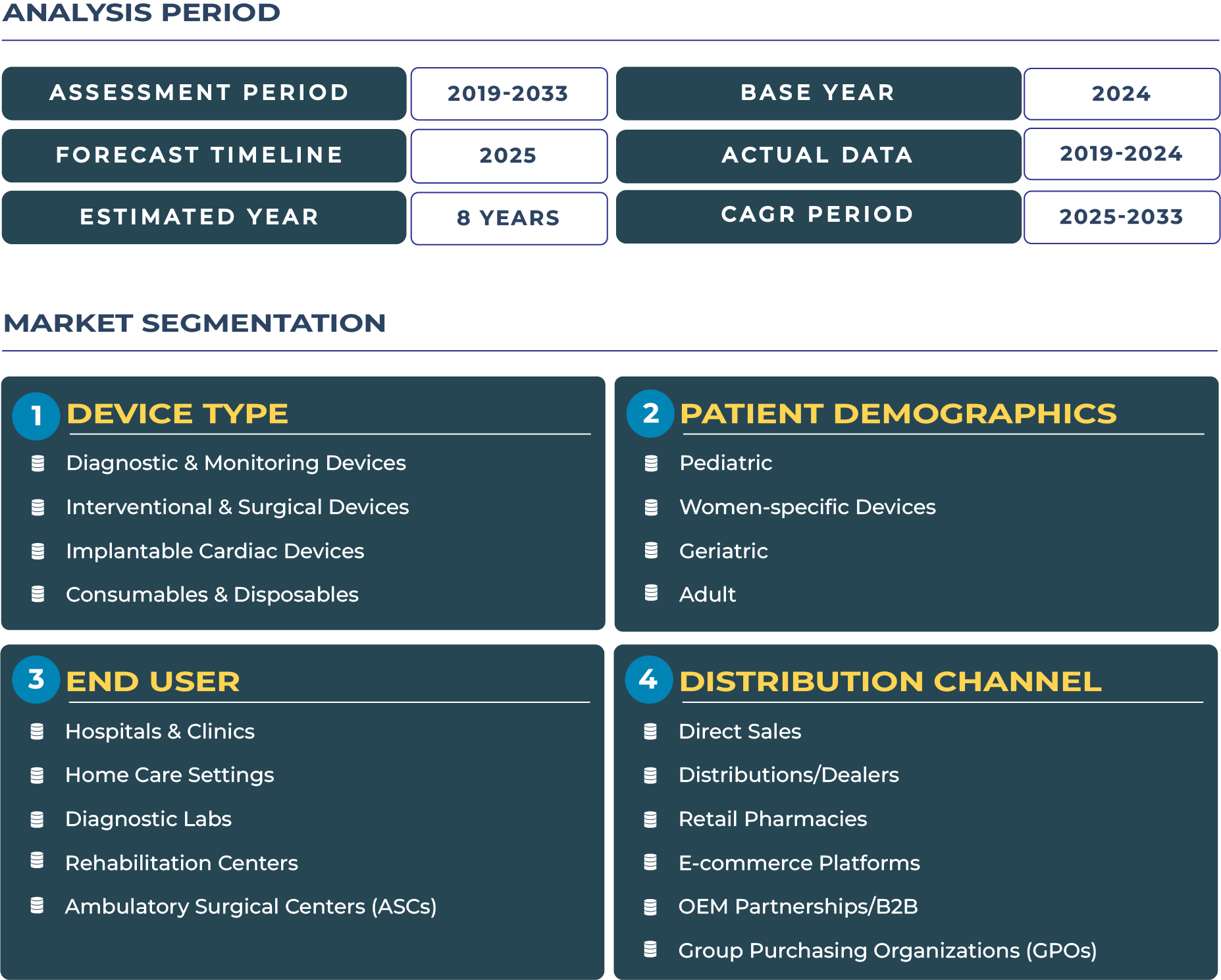Kenya Cardiovascular Devices Market Outlook
The Kenya cardiovascular devices market is undergoing a dynamic transformation, reflecting the country’s strong urban healthcare footprint and expanding private sector investment. The market is estimated to reach USD 87.4 million in 2025 and is projected to grow steadily to USD 168.3 million by 2033, registering a compound annual growth rate (CAGR) of 8.5%. This growth trajectory is fueled by Nairobi’s status as a regional medical hub, which attracts both domestic and international patients seeking advanced cardiac care. The adoption of diagnostic and monitoring devices has accelerated, especially through mobile-first solutions that allow physicians to remotely track patient vitals. Interventional and surgical devices are becoming integral in private hospitals, particularly for minimally invasive cardiac procedures that shorten recovery times. Rising demand for consumables such as catheters and stents reflects the increasing incidence of cardiovascular diseases across both urban and peri-urban populations. Kenya’s healthcare sector is also benefiting from policy-level support and ongoing collaborations between hospitals and technology providers, strengthening its cardiovascular devices ecosystem. The interplay between private innovation, telecom partnerships, and patient affordability ensures Kenya cardiovascular devices industry is well-positioned for long-term expansion.
Nairobi-Led Innovation Anchoring Kenya Cardiovascular Devices Market Growth
Kenya is emerging as an East African hub for cardiovascular devices where mobile-first adoption and private healthcare institutions are driving demand. Urban centers such as Nairobi and Mombasa are leading the charge with growing investments in cardiac care infrastructure and diagnostic innovations. Mobile health integration is a defining feature of the country’s healthcare modernization, enabling patients to access cardiovascular monitoring and post-surgical support through connected devices. This ecosystem is further strengthened by private hospitals that prioritize cardiac interventions and consumables, supported by partnerships with telecom providers. The growing momentum positions Kenya as a regional leader in cardiovascular devices, where urban adoption creates ripple effects across East Africa’s healthcare landscape.
Drivers & Restraints: Balancing Urban Momentum with Infrastructure Gaps
Drivers: Mobile-first health adoption and Nairobi as a medical hub
Kenya’s strong mobile penetration, with over 65 million mobile connections, is enabling a surge in mobile-first health solutions. Nairobi, home to some of the country’s largest private hospitals, is increasingly recognized as an East African center for advanced cardiac care. Growing numbers of private clinics are investing in interventional and surgical devices, particularly for minimally invasive procedures. The increasing burden of cardiovascular diseases linked to urbanization and lifestyle changes is further driving patient demand for diagnostic and monitoring devices. Insurance penetration and the rise of middle-income households are also expanding access to advanced treatments, sustaining steady growth in the cardiovascular devices sector.
Restraints: Rural healthcare infrastructure and affordability challenges
Despite positive growth drivers, Kenya cardiovascular devices landscape faces structural barriers. Rural healthcare facilities often lack the resources and trained staff required to deploy advanced cardiovascular equipment. High device costs and price sensitivity remain significant obstacles for broad adoption, particularly outside urban centers. Regulatory capacity is also constrained, with prolonged approval processes and limited oversight on device quality assurance. Additionally, disparities in skilled cardiologists across the country reduce access to specialized cardiac care, slowing adoption in non-urban areas. These challenges underline the need for localized solutions and capacity-building initiatives to unlock the full market potential.
Trends & Opportunities: From Mobile Health to Regional Integration
Trends: mHealth and telemedicine shaping cardiac care
Kenya’s healthcare sector is witnessing a surge in mobile health-enabled cardiac monitoring, supported by partnerships between hospitals and telecom operators. Patients increasingly rely on wearable and portable devices that connect to mobile platforms for real-time monitoring. Private clinics are enhancing their cardiac service lines, particularly in Nairobi and Mombasa, by investing in interventional devices and consumables. Telemedicine programs are also expanding into semi-urban and rural counties, ensuring broader coverage for patients who previously lacked access to specialized cardiovascular care.
Opportunities: Telecom bundles and localized training as growth levers
The most promising opportunities in Kenya cardiovascular devices sector lie in telco-based monitoring bundles that integrate device financing and data connectivity. Partnerships with private clinics create strong entry points for companies introducing new device models. Training programs in county hospitals present another opportunity to strengthen adoption by equipping local staff to manage advanced diagnostic and surgical tools. With the government prioritizing universal health coverage, cardiovascular devices companies can align with policy priorities while tapping into emerging demand across both urban and county-level facilities.
Competitive Landscape: Strategies Driving Cardiovascular Devices Adoption in Kenya
The Kenya cardiovascular devices market is shaped by international players like Medtronic and Abbott, alongside local distributors and regional healthcare providers. Strategies increasingly focus on Nairobi and Mombasa, where private hospitals are upgrading cardiac care facilities with diagnostic imaging and minimally invasive surgical devices. In 2024, several telco-health pilot projects were launched in Nairobi, combining telecom connectivity with cardiac monitoring solutions. Consumables such as stents and catheters are seeing heightened demand as hospitals scale interventional procedures. Training initiatives are also gaining importance, with device manufacturers collaborating with county hospitals to build technical capacity. The emphasis on affordable models, coupled with private-public partnerships, underscores Kenya’s role as a gateway cardiovascular devices market for East Africa.







